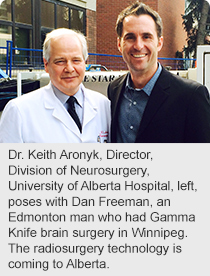
August 27, 2015
Story by Gregory Kennedy & Nicole Merrifield
EDMONTON — Brad Freeman’s nightmare began with seizures — brief, uncontrollable moments that felt like dreams.
A CT (computed tomography) scan by University of Alberta Hospital doctors soon found a tangle of abnormal blood vessels, called an arteriovenous malformation (AVM), growing on his brain. Were it to rupture, he could die.
While the news was as grim as it gets, the bigger issue facing this husband and first-time father to a bouncing baby boy was this: how best to remove it?
|
|
Two options were presented to this Edmontonian: open brain surgery with a three-month recovery; or the Gamma Knife, a non-invasive, incision-free procedure that would have him back home with his loved ones the next day.
The Gamma Knife sounded too good to be true. But there was a catch: the closest Gamma Knife is in Winnipeg, where Freeman ultimately chose to undergo the procedure which has restored him to full health.
Thanks to the University Hospital Foundation’s next major investment in the advancement of brain care at the University of Alberta Hospital, future patients will be able to receive the world’s most advanced brain care closer to home.
Alberta’s first Gamma Knife and Clinical 3T MRI Centre — with the capability to pinpoint hard-to-reach brain tumours and perform life-saving surgery without a scalpel — is coming to the University of Alberta Hospital.
A sod-turning on Aug. 27 marks a milestone in the foundation’s Brain Centre Campaign, with $17.5 million in donor support, dedicated to a Gamma Knife and 3T MRI (magnetic resonance imaging) scanner — two medical devices that offer the most advanced, non-invasive and pain-free technology now available for treating brain patients. Construction on the new centre begins in September 2015.
“Gamma Knife radiosurgery is pain and incision-free,” says neurosurgeon Dr. Keith Aronyk, Director, Division of Neurosurgery, University of Alberta Hospital. “There’s no operation. So there’s no anesthesia. You come in the morning and go home in the afternoon, having had the definitive treatment for many brain conditions. It’s almost miraculous.” 
Vickie Kaminski, President and CEO of Alberta Health Services (AHS), says the project “has the potential to revolutionize neurosurgery in this province and to provide new hope to individuals who need, but cannot undergo, traditional brain surgery.”
Gamma Knife radiosurgery focuses close to 200 tiny beams of radiation on a target to treat brain tumours, malformations and movement disorders such as Parkinson’s disease. With no need to open the skull, not only is the patient spared scalpels, general anesthetic, blood loss, infection risks and prolonged recoveries, but they typically return home the same day.
They’re back to living their regular lives within 24 to 48 hours with a noticeable difference — their debilitating headaches, terrifying seizures or life-threatening tumours are either completely gone or reduced enough for them to live a life that’s not dictated by their condition.
The 3T MRI scans up to four times faster than a traditional MRI unit, meaning patients who struggle to lie perfectly still in a confined space for long periods, such as those with movement disorders, won’t have to. 3T MRI images let neurosurgeons make more precise diagnoses and deliver more focused disease management in many therapeutic areas.
Freeman says he’s delighted with news of the new local centre.
“Future brain care patients in Alberta are incredibly fortunate to have access to this remarkable technology,” he says. “Patients in the past had to make really tough decisions on how to handle devastating brain conditions. With the Gamma Knife, they will receive the best treatment in the world and their lives will carry on with minimal impact. This is an exciting day for all Albertans.”
More than 350 patients from across the province will benefit annually from the surgical expertise and leading-edge technology available at the Gamma Knife and Clinical 3T MRI Centre when it opens in the fall of 2017.
The Gamma Knife and Clinical 3T MRI Centre marks the completion of fundraising for the second phase of the University Hospital Foundation’s Brain Centre Campaign.
The first phase, the Dan & Bunny Widney 3T Intraoperative MRI Suite ($6.2 million), has been changing and saving lives since it opened in 2012 by enabling brain surgeons to take precise images of a patient’s brain during surgery. As well, the suite is home to groundbreaking research into brain tracts, or pathways in the brain, that are used to convey messages.
The final phase and centrepiece of the Brain Centre Campaign is to build and equip a state-of-the-art Brain Centre where patients will receive co-ordinated care from diagnosis to surgery (if needed) to rehabilitation from brain-related specialists working together in a specialized care environment.
“Our vision for the Brain Centre has always been to provide the best doctors with the most advanced equipment,” says Jim Brown, Brain Centre Campaign Co-Chair with the University Hospital Foundation. “Breaking ground on the new Gamma Knife and Clinical 3T MRI Centre is the culmination of tremendous community support and a shared commitment to provide the best care possible to brain patients.”